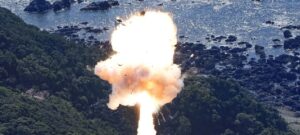 A summary of two significant space launch events in Japan involving private and national space agencies, showcasing both successes and setbacks in the country’s space exploration endeavors.
A summary of two significant space launch events in Japan involving private and national space agencies, showcasing both successes and setbacks in the country’s space exploration endeavors.
Japanese Rocket Explodes Shortly After Launch
A rocket belonging to a private Japanese space company exploded shortly after launch, destroying a satellite on board as well. Apparently, the self-destruction mechanism was triggered.
Failed Satellite Launch by Private Japanese Company
In Japan, the satellite launch by a private company failed with the explosion of the carrier rocket. According to Japanese media reports, shortly after the launch of the 18-meter-long carrier rocket “Kairos” for reasons initially unknown, the self-destruct mechanism was activated. A fireball, thick smoke, and debris falling into the surrounding mountains were observed. The Tokyo-based company Space One intended to send a satellite into orbit from Japan’s commercial Space Port Kii in the western Wakayama Prefecture. The reason for the unsuccessful launch is under investigation. The failed launch is a setback for Japan’s efforts to enter the potentially lucrative market of commercial rocket launches.
Successful Launch by Jaxa
In contrast, Japan’s national space agency, Jaxa, recently succeeded in launching the new H3 carrier rocket after an initial failure. The rocket took off last month from Japan’s Tanegashima Space Center in the country’s southwest with a satellite mockup and two tiny satellites on board. With this relaunch, Jaxa aimed to dispel doubts about the reliability of the new carrier rocket.
During an initial launch attempt last year, the second-stage engine failed to ignite. As the mission had no chance of success, the self-destruct mechanism was activated shortly after liftoff. The H3 is the successor to the reliable H2A rocket and Japan’s first new development of a large carrier rocket in about 30 years. The H3 is considered more powerful, cost-effective, and safer than the H2A, which is expected to be phased out soon.
